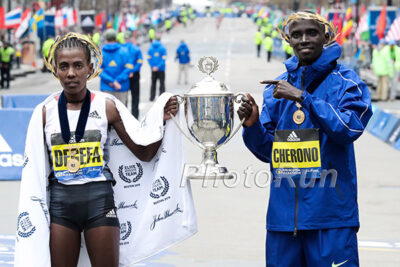2021 Boston Marathon Is Scheduled For October 11; All Six World Marathon Majors to Be Contested in 6-Week Span
By Jonathan Gault and Robert Johnson
January 26, 2021
The B.A.A. announced Tuesday that the 2021 Boston Marathon will take place on Monday, October 11. The race had already been postponed from its traditional spot on the calendar in April and until today remained the only World Marathon Major yet to announce a date for its 2021 edition. The announcement comes with one significant caveat — it will only take place if Massachusetts’ reopening plan allows for road races by the fall.
“We announce the 2021 Boston Marathon date with a cautious optimism, understanding full well that we will continue to be guided by science and our continued collaborative work with local, city, state, and public health officials,” B.A.A president and CEO Tom Grilk said in a press release.
Boston is the only WMM to be held on a weekday, traditionally taking place on Patriots’ Day — the third Monday in April and a state holiday in Massachusetts. This year’s race will retain the Monday date and will coincide with a national holiday, Columbus Day. With the Chicago Marathon scheduled for October 10, this also means two of the world’s largest marathons will be contested on consecutive days.
The most condensed World Major Marathons schedule in history is now set — all six WMM events are slated to be held within a six-week span in the fall. Here’s how it will look (with the Olympics included as well):
August 7 – Women’s Olympic Marathon
August 8 – Men’s Olympic Marathon
September 26: Berlin Marathon
October 3: London Marathon
October 10: Chicago Marathon
October 11: Boston Marathon
October 17: Tokyo Marathon
November 7: New York City Marathon
What will the weather be like?
The temperature in mid-October in Boston is normally ideal for running. DarkSky – our favorite weather app- says we can expect a race day temperature in the 50s during the elite portion of the race (9:30 – 12 noon roughly).
If the averages hold up, it will be a tiny bit warmer than your normal Boston marathon as October temps in Boston are normally 5-6 degrees warmer than April. The good news is the weather in the Northeast of the US is a little bit more predictable and less in extreme than in the spring. For example, the record high in Boston in October is 90 and the record low is 25 whereas in April those numbers are 94 and 13.
What does this mean for the elite races?
While it may seem exciting to have a World Marathon Major on the calendar pretty much every weekend this fall, the unique schedule will have a massive effect on the quality of the fields at the majors. It will be virtually impossible for an elite marathoner to run more than one WMM this fall. Berlin and NYC are the most spread out, and they’re still only six weeks apart. For reference, many were amazed by Sara Hall‘s ability to double last fall at London and the Marathon Project. The gap between those two races, 11 weeks, is almost twice as large as the smallest gap between majors in 2021.
The fall marathon fields were already going to be somewhat diluted this year due to the Olympics (the Olympic marathons are on August 7 & 8). Now, with five other majors to recruit against (not to mention Valencia on December 5, quickly becoming one of the most competitive and best-funded races in the world), the fields at some majors will be among the shallowest in recent memory.
Let’s look at 2019 as an example. Below is a breakdown of each WMM men’s field that year by personal best:
| Race | Sub-2:04 | Sub-2:05 | Sub-2:06 | Sub-2:07 | Sub-2:08 |
| New York | 0 | 3 | 3 | 4 | 4 |
| Berlin | 1 | 3 | 3 | 5 | 5 |
| Chicago | 0 | 4 | 5 | 7 | 9 |
| London | 2 | 7 | 9 | 9 | 10 |
| Boston | 0 | 5 | 6 | 12 | 15 |
| Tokyo | 1 | 4 | 9 | 9 | 10 |
And here’s a look at the names of all the sub-2:05 guys entered in each race:
New York: Tamirat Tola, Lelisa Desisa, Shura Kitata
Berlin: Kenenisa Bekele, Sisay Lemma, Birhanu Legese
Chicago: Lawrence Cherono, Asefa Mengstu, Dickson Chumba, Seifu Tura
London: Eliud Kipchoge, Wilson Kipsang, Mosinet Geremew, Leul Gebresilase, Tamirat Tola, Mule Wasihun, Shura Kitata
Boston: Lawrence Cherono, Sisay Lemma, Lemi Berhanu, Solomon Deksisa, Lelisa Desisa
Tokyo: Birhanu Legese, Dickson Chumba, El Hassan El Abbassi, Seifu Tura
That’s 26 sub-2:05 guys. But eight of them ran races in the fall and spring. So really, it’s 18.
Eighteen sub-2:05 guys is fine when there are only three majors per season. But when you’re recruiting against five other majors (plus the Olympics, plus Valencia, plus Amsterdam, etc.)…well, suddenly 18 doesn’t seem like quite so many. It will be fascinating to see how it all plays out.
The prediction here: London, which puts more money and emphasis into the elite race than the other five majors, will remain mostly the same. Year after year, we’ve seen London outbid Tokyo and Boston for the top talents. If they can outbid those races, why won’t they also be able to outbid Berlin, Chicago, and New York? The other races may not even mind. They all will have taken a hit by not holding in-person mass races in 2020, and could be grateful to London for scooping up the top talent and giving them an excuse to trim their elite budget for this year.
Other things to watch out for:
- How does Valencia factor in? Last year, London and Valencia were both technically fall marathons, but in reality they weren’t really competing against each other for athletes. Pretty much everyone who committed to London back in January wound up running it, and Valencia had its pick of everyone else in the world. This time, the two marathons will be going head-to-head for talent. And Valencia, which had an elite budget of $6.4 million between its half and full marathon last year, could have the funds to be competitive with London.
- Expect to see a lot of athletes doubling back from the Olympics. In a normal year, it’s not uncommon for athletes to run the Olympics and double back for a fall major. In 2021, it should be more popular than ever. Remember, many of these athletes missed out on at least one (and perhaps two) paydays in 2020 due to COVID, and pretty much all of them will miss out on another due to the barren 2021 spring marathon season. The Olympics has no appearance fee. Thus, there will be a ton of athletes looking to (finally) get paid. So expect to see plenty of them in New York (13 weeks after the Games) and Valencia (17 weeks).
And don’t be shocked to see them in Chicago or Boston, either. Yes, the gap between the Olympics and Chicago/Boston is only nine weeks. But if you’re Aliphine Tuliamuk or Abdi Abdirahman, why wouldn’t you do it? The race gets to promote a US Olympian in the field, and you get a nice appearance fee no matter how you run. It’s a win-win. - This is a good thing for American marathoners. In a couple of ways. From the race perspective, if there’s less top-tier international talent available, races like Chicago, Boston, and New York could look inward, pumping up their domestic budgets and promoting the top Americans more — which is easier to do as a number of them are coming off shiny new personal bests in 2020. And from the athlete perspective, weaker elite fields bump up the chances of an American landing on the podium.
Talk about the new date for the 2021 Boston Marathon on our fan forum / messageboard.

